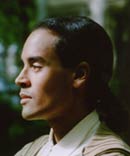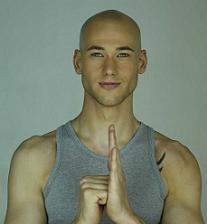
He does not walk but seems to float on a cloud. For his entrance on stage, the sopranist of Martiniquais origin, Fabrice Di Falco, steps forward slowly and deliberately, a fine, evanescent silhouette carried by the spirituality of the organ melody (Huguette Grémy-Chauliac) and supported by the discreet rhythm of the cello (Frédéric Audibert). Thus began, within the framework of the Nice Festival “It’s not classical” intended this All Saints weekend to “make classical music both friendly and accessible,” the performance of the sopranist whose rendition of Oberon in “A Midsummer Night’s Dream” given last spring at the Nice opera had sparked, as we remember, genuine enthusiasm.
In this amphitheater with the martial name of “Athena,” despite the acoustic difficulty coupled with drying heat, Fabrice Di Falco valiantly chose as his first piece the “Cold Song” from Purcell’s opera “King Arthur,” performed in bass and then in sopranist “to pay tribute to both voices,” explains the lyrical artist. Quite a symbol for this first prize of the French conservatory who, after a widely acclaimed career in the exceptionally high register, acknowledges returning to the baroque fold for having “gained in the lower register,” once past thirty. One can hardly complain as this change opens a new and broad repertoire for him. Although it took him a little while to adapt his voice to the ambient atmosphere, facing slight difficulties in some of the virtuoso elements of one of the two major airs from “Farnace” in Mozart’s “Mithridate,” the second part allowed him to enchant his audience, following with an excerpt from “Xerxes” by G.F. Handel, the “Ave Maria” by Caccini, and Antonio Vivaldi’s “Stabat Mater,” the last piece which he had choreographed himself.

To accomplish this, he had asked Samuel Aldrich, a friend, martial arts specialist (Viet Vo Dao Vovinam) and black belt in full contact, to perform alongside him, handling all kinds of weapons from the nunchaku to the saber, including Chinese fans. An unusual yet skillfully orchestrated collaboration between singer and athlete-actor: in the introduction of each aria sumptuously performed by Fabrice Di Falco, Samuel Aldrich took on the role of a brief recitative allowing in one or two declaimed sentences to remind the audience of the Virgin Mary’s sufferings during the crucifixion of the Savior. Then, he moved with meticulously elaborated movements according to the theme of the piece or displayed static postures whose high degree of concentration invited profound contemplation. At the end of the show, the sopranist explained that despite appearances, martial arts and baroque music “converged towards a common point”: like a strike–the famous “Ki” concentrated at the tip of the point and at the origin of the rupture, the fatal blow–the melody, after a slow and progressive ascent, was charged with extraordinary energy that came to “touch the human being” deeply. One will understand: if the few “gained low notes” are likely to make his vocal range “angelic” evolve, his appetite for “pious and pure” music will certainly not be diminished.


